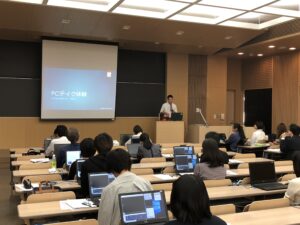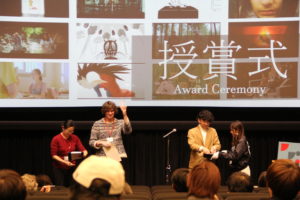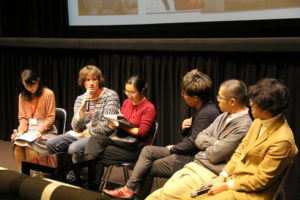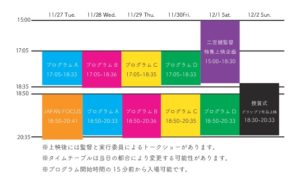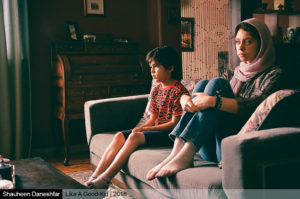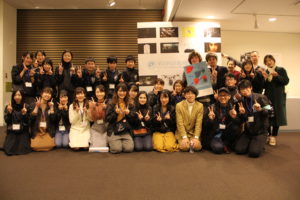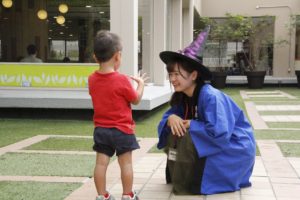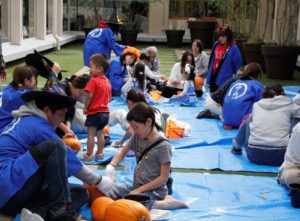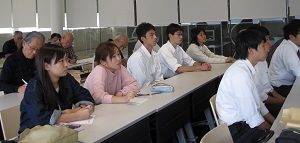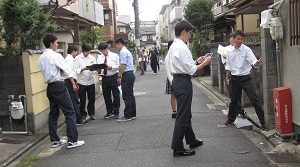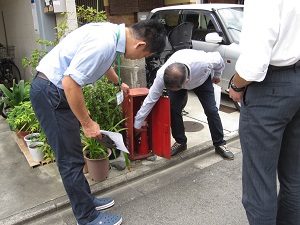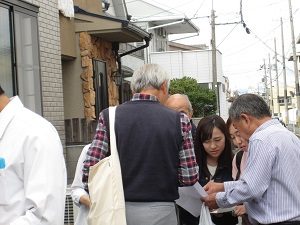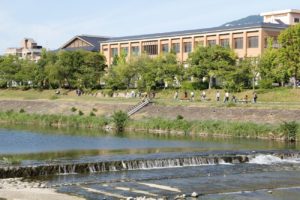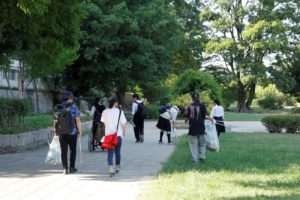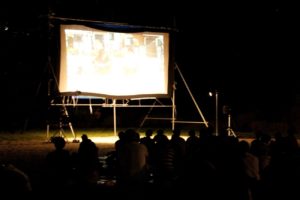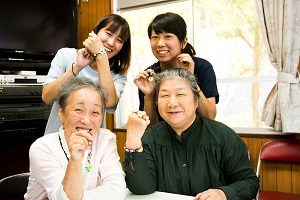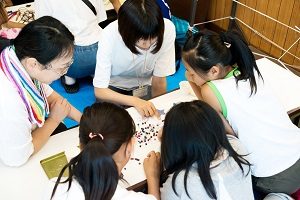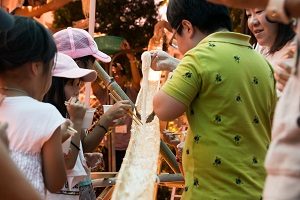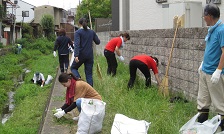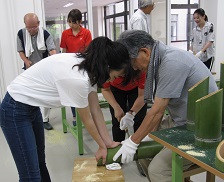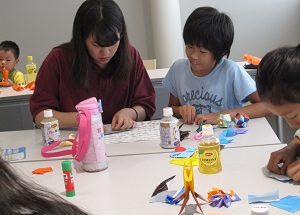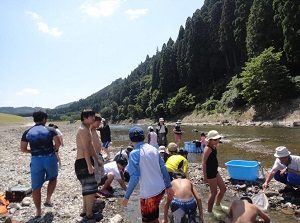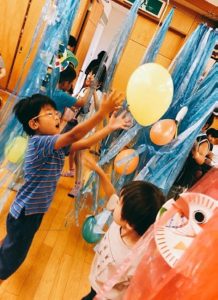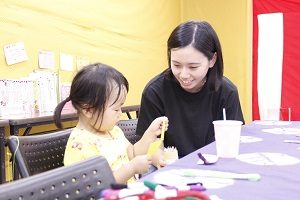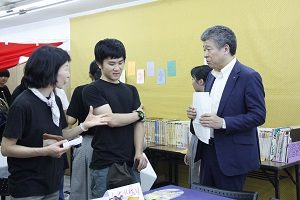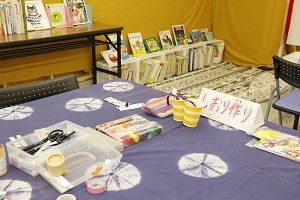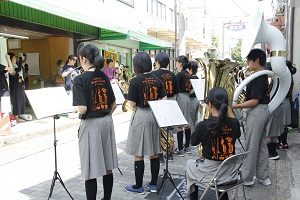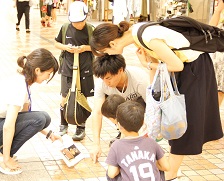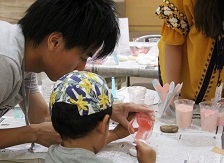We will introduce the efforts of the Heisei 30 academic town collaboration project.
In order to create attractive communities and solve local issues, the “Gakumachi Collaboration Project” invites universities and students to work on projects in collaboration with the local community, and provides subsidies and support for outstanding initiatives. We would like to inform you of this year’s initiatives.
【Activities】Ryukoku University Fukakusa Machiya Cinema (Fushimi and Fukakusa Community Archive Project)
The “Fukakusa Machiya Cinema” by the Matsuura Seminar of the Faculty of Policy Studies, Ryukoku University, is an organization that mainly collects and archives 8mm film in order to preserve for future generations the images and photographs of the Showa period of Fushimi Ward that lie dormant in the area, and to provide opportunities for elderly people living alone, who tend to be isolated, to go out. We visited Fukakusa Elementary School and Ryukoku University, the venues.
At Fukakusa Elementary School, “Where is this?” was held in the “Fureai Salon” sponsored by the Fukakusa Social Welfare Council, which aims to interact with the elderly in the community. Under the theme of “Fushimi and the streetcar,” photos from the Showa era and photos from the same place today were projected on the screen, and memories of that time were shared while comparing them.
The moderator asked, “How much was the fare at that time?” and “What was your childhood play?” Mr./Ms. all the participants responded to such questions while talking nostalgically with the people around them.
At the “2nd Machiya Cinema” held at Ryukoku University, a video of the time when the streetcar was running was played, and Mr. Mr./Ms. Fukuda, who has been photographing streetcars in Kyoto, explained about it. In addition, a participant who used a streetcar at that time talked about the memory of sounds, such as “I used the sound of the first streetcar as a clock,” and when private cars were not very popular among citizens, streetcars were inexpensive and could ride far away at a flat fare. I was also able to learn about the problems that have arisen with the changing times.
The group’s activities, which are celebrating their fifth year this year, have been warmly welcomed by the local community, who say, “It’s fun to see the faces of young people.” The students expressed their aspirations to develop the activity from “learning about the past” to “passing on Showa culture” to children living in the community in the future.
【Activities】Kyoto Seika University Keihoku Utsu Treasure Search Club
We would like to introduce an activity report from a member of the “Keihoku Utsu Treasure Hunting Association”, which works to rediscover and revitalize the charm of the region through the search for local treasures (nature, people, technology, tradition, history, etc.) in the Uzu area of Keihoku-cho, Ukyo-ku, Kyoto City.
Repainting of playground equipment at Awaudani Children’s Park Activity Report Click here for the report
Utsukyo Park Children’s Tree Classroom, Photography Class, Children’s Park Playground Equipment Repainting Activity Report Click here for the report
【Activities】 Halloween in Saiin Lantern Making Workshop
In addition to the “Halloween Parade in Saiin” to be held on Sunday, October 28, the “Halloween in Saiin Executive Committee” of Kyoto University of Foreign Studies visited the venue of the lantern-making workshop because it provides a time for children to interact with local residents and have fun and feel safe through workshops at the children’s center and lantern-making workshops.
At 1:00 p.m., the event started at 1:00 p.m., and the venue, Kyoto Family 3rd floor, “Kyo Fami-Garden” was crowded with many participants, mainly children. Choose your favorite pumpkin and hollow it out. The difficult part was helped by parents and students on the executive committee, and the lantern was completed with a lot of personality. Not only could you take home the lanterns you made, but you also got a candle present. I’m really looking forward to seeing how the lights come on.
Easy-to-understand instructions and tools are prepared for those who are trying to make lanterns for the first time, and they seem to be very accustomed to it, such as immediately helping participants with troubled expressions. When I talked to the students on the executive committee, they said that they had been working on the project even before they applied for the Gakumachi Collaboration Project. Now, when he meets people in the community near the university, they tell him that he is a Halloween child.
Many of the students who are currently active are third-year students, so handing over to second- and first-year students is an issue. We hope that it will become established in the community as a Halloween event in Saiin. Also, it seems that the parade was canceled last year due to the approach of the typhoon, so we wish the “Halloween Parade in Saiin” a success!
【Activities】Ryukoku University, Higashitakase River Environmental Protection and Jizo Bon Project Team
The Fushimi Fukakusa-Higashitakase River Environmental Protection and Jizobon Project Team, which is made up of the Ryukoku University Junior College Department, plans and operates river cleanup activities and the “Jizo Bon Program” with the involvement of high school students and others in collaboration with the local community in order to pass on local traditional events to the next generation and to improve the environment of the Higashitakase River, which is the venue. We have received an activity report, so we would like to introduce it.
◎ Promotion of exchange of traditional events has progressed to a workshop on “Disaster Prevention Map Making”
The Kawakubo Town Residents’ Association, which deepened the bonds between residents due to the continuation of traditional events, gained momentum to create a “disaster prevention map”. Therefore, on October 2, the residents’ association conducted fieldwork in the town with students from Ryukoku University and Kyoto Kogakuin High School.
On this day, we plotted the locations of “fire extinguishers” and “fire hydrants” installed by the residents’ association on a map and reconfirmed the temporary meeting place in the event of an emergency evacuation. The residents’ association provides information on the homes of the elderly on the map. The first workshop was held in a fulfilling atmosphere, with university students providing support based on their knowledge of social welfare, and high school students sharing ideas from the hardware side of things, such as buildings and road conditions, based on their expertise in engineering.
【Activities】Camo Cinema Executive Committee
On Saturday, August 18th, we went to the Kamo River cleanup and outdoor movie screening of “Kamo Cinema 14”!
Sixteen years ago, students at Ritsumeikan University, who were interested in the conservation of the Kamo River, which plays a major role in creating a landscape that is unique to Kyoto, established the Camo Cinema Executive Committee. For the 14 years since its inception, the festival has held cleanup activities on the Kamo River, projects of interest to students, and outdoor movie screenings after sunset every summer as part of efforts to raise awareness of beautification among young people.
“Kamo Cinema 14” started from the Kamo River Riverbed Clean Hike, which was renamed “Pika Kamo”. From this year, a new project called “Play in Kamogawa” has been added, and you can enjoy the Kamo River in a leisurely and bright time while playing games using water.
The expression of the Kamo River, which changes from daytime to sunset, is also an attraction of “Camo Cinema”. The screen projected dimly in the dark was fantastic. When the sun went down, customers brought leisure sheets one after another.
This year’s film is “Seto Tsumi”. It’s a simple movie about two high school students, Seto and Utsumi, talking by the river. However, in these conversations, the worries, thoughts, and love affairs unique to high school students are realistically depicted. In the sense that you can say what you really think where the water flows, the screening in the Kamo River is perfect. Under the starry sky with a pleasant breeze, I was able to spend a luxurious time sitting on the riverbed and watching a movie, which is only once a year.
In addition to holding outdoor movie screenings, the Kamo Cinema Executive Committee participates in events and cleanup activities organized by the cooperating organization “Kamogawa Beautification Association” to deepen exchanges with local residents. They have also been able to establish cooperative relationships with companies. Please continue your activities so that participants can have fun and raise awareness of the beautification and conservation of the Kamo River!
【Activities】Kyoto Tachibana University Society for Contemporary Business Studies Urban Development Study Group
On Saturday, August 18th, we visited the “Shimizu Ware Painting Experience Workshop”, which is part of the activities of the “Daigo Nakayama Housing Complex Revitalization Project” by the Kyoto Tachibana University Society for Contemporary Business Studies!
In this project, volunteers from the Faculty of Contemporary Business of Kyoto Tachibana University have been working together with local residents, including the neighborhood association, since last year, mainly on the “Daigo Nakayama Complex Pottery Lantern Road” to promote regional exchange in the Daigo Nakayama Housing Complex.
The “Pottery Lantern Road” implemented in the Yamashina area is an initiative with a history of more than 10 years, and the cityscape illuminated by ceramic lights is beautiful and has been very well received. Last year, we started working on the idea of implementing this “Pottery Lantern Road” in the Daigo Nakayama Housing Complex.
The “Shimizu Pottery Painting Experience Workshop” was positioned as a pre-event for the “Pottery Lantern Road” named after pottery, and the elderly and children in the community happily created accessories with their own designs. After the workshop, various projects were held until the evening, such as playing with soap bubbles in the park and authentic somen noodles made by cutting bamboo from the back mountain with the cooperation of the Kyoto University of Education Bamboo Friendship Association.
On November 3rd, the “Pottery Lantern Road” at the Daigo Zhongshan Complex is scheduled. Last year, the scope of the event was reduced due to bad weather, but this year we are blessed with good weather and we hope that the project will be successful!
【Activities】Ryukoku University, Higashitakase River Environmental Protection and Jizo Bon Project Team
We would like to introduce the activity report from the “Ryukoku University-Higashitakase River Environmental Protection and Jizo Bon Project Team”, which continues to work in the area around the Higashitakase River in Fushimi Ward.
We are steadily preparing for this year’s Jizo Bon August 18 (Saturday)! Click here for the report
【Activities】Kyoto Seika University Keihoku Utsu Treasure Search Club
We would like to introduce an activity report from a member of the “Keihoku Utsu Treasure Hunting Association”, which works to rediscover and revitalize the charm of the region through the search for local treasures (nature, people, technology, tradition, history, etc.) in the Uzu area of Keihoku-cho, Ukyo-ku, Kyoto City.
Keihoku Music Festa Event Report [September 16] Click here for the report
(Presenter: Mr./Ms. Hirose, Faculty of Humanities, Kyoto Seika University)
Utsu Summer Festival Naryo Gathering Report [August 14th, 15th, 16th] Click here for the report
(Presenter: Mr./Ms. Terada, Faculty of Humanities, Kyoto Seika University)
Report on the collaboration event “Udon Disco” with Parent-Child Smile Factory [August 6] Click here for the report
(Presenter: Mr./Ms. Kaneda, Faculty of Humanities, Kyoto Seika University)
The 5th Children’s Festa in Utsu Activity Report [August 4th and 5th] Click here for the report
(Presenter: Kyoto Seika University, Faculty of Humanities, Mr./Ms. Sakito Tokumi, Mr./Ms. Yamamoto)
【Activities】Ryukoku University Yodohoncho Shopping Street Fureai Library Project
On Sunday, August 5th, I visited the opening of the library of Ryukoku University’s “Yodohoncho Shopping Street Fureai Library Project”.
In this project, students of the Inoue Seminar of the Faculty of Policy Studies, Ryukoku University, have been conducting field surveys since the 29th academic year with the aim of revitalizing shopping streets that are losing their vitality due to a decrease in customer attraction and diluted local communities. Perhaps due to the closure of bookstores in the shopping district, we learned that there was a high need for libraries in the Yodo area, and we have been preparing for the opening of a library in a vacant store in the shopping street.
The event opened with a performance by the brass band of the local Oyodo Junior High School. In addition to exhibiting books donated by students and local residents, the library also has a bookmark-making corner and a café space, so it can be used as a place for local people to interact. On this day, people from the local community who were donated books stopped by and were seen talking with the students while looking inside with interest.
Since this is the first time this has been attempted, students visit the nearest children’s center or elementary school and distribute leaflets, and they are conducting public relations activities through trial and error.
In the future, in addition to the library once a month, there are plans to develop joint products with people in the shopping district and publish free papers. I hope that you will make steady progress step by step so that the charm of the Yodo region can be conveyed to people inside and outside the region!
【Activities】Bukkyo University Waku Waku Laboratory
On Thursday, August 2nd, we visited the “Children’s Science Classroom” by the “Waku Waku Laboratory” in Kamigyo-ku, Kyoto City.
The “Waku Waku Laboratory” is run by seminar students of Associate Professor Toyosei Hirata of the Faculty of Education, Bukkyo University. Once a month, they hold science experiment classes for elementary school students in the vicinity of Kitano Shopping Street with the aim of revitalizing the community, supporting children’s learning, creating a place for them to belong, and interacting with other generations.
This time, it was held as part of the summer vacation Terakoya event in Zest Oike, jumping out of the usual Kitano area. The theme is “Fossil Exploration with Zest: Let’s Find Ammonites”.
The marble used in the passage of Zest Oike contains fossils of 150,000-year-old ammonites, belemnites (bone-like tissues at the end of the head of a bandit), and other single-celled organisms. The children were guided by the students and were absorbed in exploring the fossils on the ground.
After the fossil search, it is time to make fossil replicas. It is made by pouring resin into a plastic mold of your favorite fossil. Many of the seminar students aim to become teachers, and they have gained experience in teaching practice, and they skillfully instruct while attracting the interest of the children.
In addition, there are many spots in Kyoto City where you can see similar fossils (Porta, Kyoto Station Underground Shopping Mall, The Museum of Kyoto, Kyoto Central Post Office, Sanjusangendo Hall, etc.). Please look for Mr./Ms. when you go out. Places that you usually pass by casually turn into interesting things. I think the children were able to deepen their interest in science from a familiar place.
The “Children’s Science Class” will continue to be held monthly at the “Ninwa Kaikan” in Kamigyo-ku.
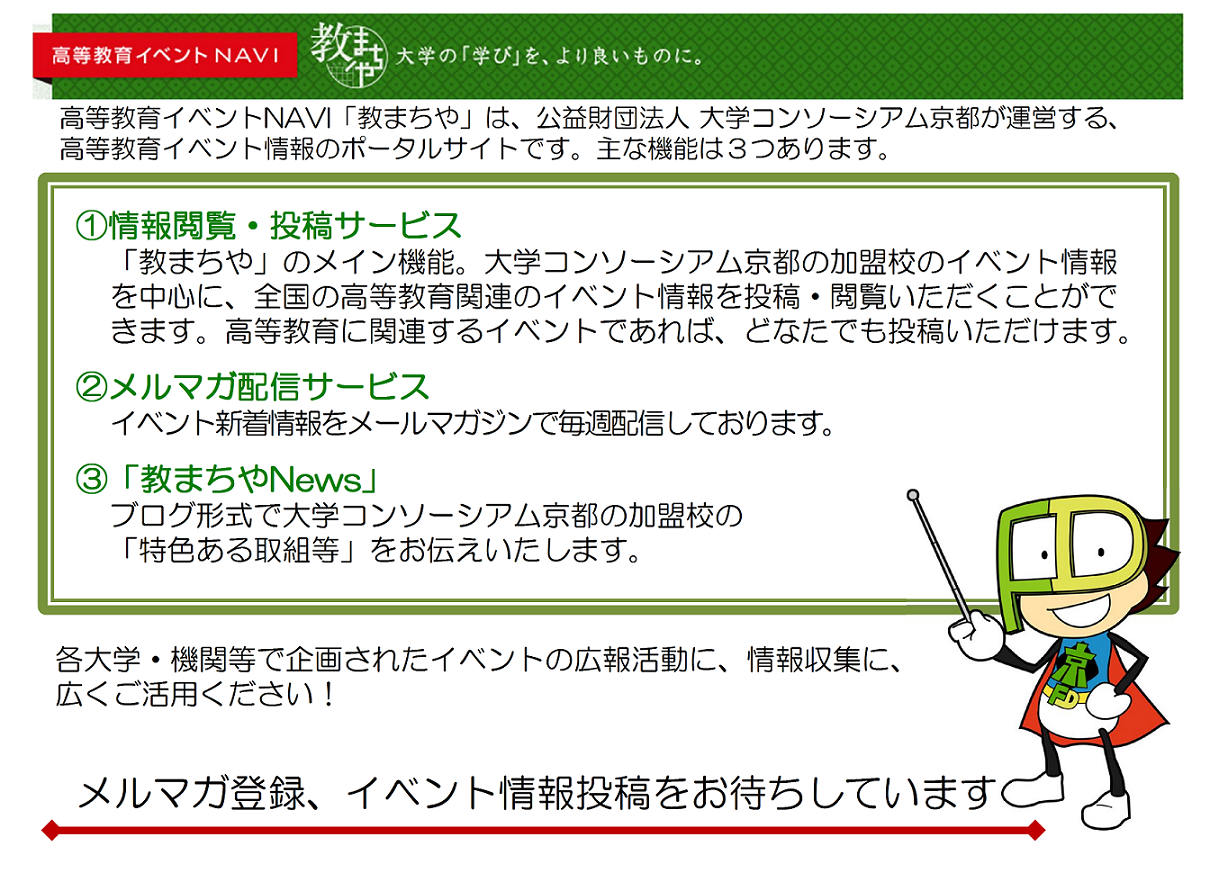
![]()














